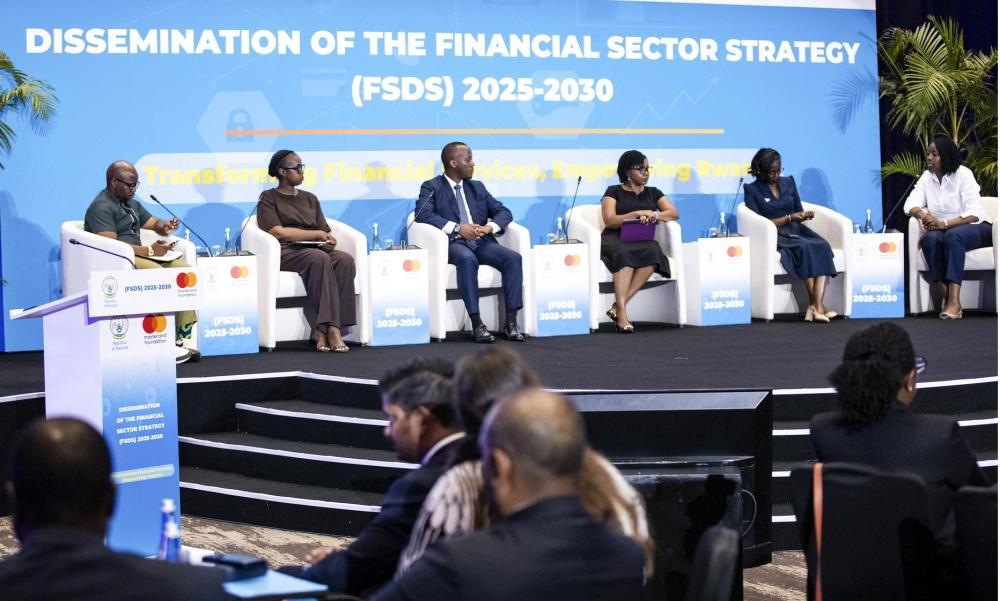Africa-Press – Rwanda. Experts have called on the government to list more state-owned enterprises (SEOs) on the Rwanda Stock Exchange (RSE) as a way to boost market liquidity, attract new investors, and position the country as a leading financial hub in the region.
The call was made on Thursday, October 16, during the official launch of the Financial Sector Development Strategy, a five-year plan that aims to position the country as a regional financial hub.
This comes as Rwanda’s capital market, though steadily growing, remains relatively small and dominated by few institutional investors.
“Our challenge is that there are limited products on the RSE. For the market to grow, we must expand the range of instruments available to investors especially equities,” said Ivy Hesse, the CEO of BK Capital.
The Rwandan market continues to be driven primarily by large institutions such as the Rwanda Social Security Board (RSSB), which holds 44 per cent of total market investments.
Banks account for 28 per cent, insurance companies 18 per cent, while the Agaciro Fund controls about 7 per cent. Retail and private pension investors collectively make up only 3 per cent, though this segment is gradually expanding.
According to the latest data, the total market capitalisation stood at $2.66 billion in 2024, equivalent to 21 per cent of the country’s GDP, representing a 6.4 per cent growth from the previous year.
In comparison, neighbouring Kenya’s market capitalisation accounts for about 38 per cent of GDP, while South Africa’s Johannesburg Stock Exchange (JSE) stands at over 170 per cent of GDP, highlighting Rwanda’s vast potential for expansion.
“In many African markets, the turning point came when governments took the initiative to list state-owned enterprises. When citizens see familiar and trusted companies on the stock exchange, it builds confidence and encourages private firms to follow,” Hesse noted.
“Listing government-owned entities will not only deepen the market but also create new opportunities for Rwandans to participate directly in wealth creation,” she added.
According to Hesse, Rwanda already has a reputation as a place where things get done. With the right policies and digital infrastructure, the country can become the gateway for investment into the rest of Africa.
“If we want our capital markets to contribute at least 10 per cent of GDP [gross domestic product] by 2050, we must act decisively now by listing more state enterprises,” she said.
Encouraging broader public participation will be key to unlocking liquidity and stimulating activity on the exchange, she said.
A modest yet promising market
The Rwanda Stock Exchange is currently home to only ten listed companies, including BK Group PLC, CIMERWA PLC, MTN Rwandacell PLC, I&M Bank Rwanda, and Braliwa. Regional firms such as Equity Group Holdings, KCB Group, and Nation Media Group are also cross-listed from the Nairobi Securities Exchange.
However, trading volumes remain low. In 2023, the volume of equity trades stood at 608, worth Rwf11 billion, a 37 per cent decline in value compared to 2022. Analysts attribute this to the market’s narrow investor base and the limited number of listed firms.
While equity activity remains subdued, the country;s bond market is expanding rapidly. In 2024 alone, the government issued 11 Treasury Bonds, achieving an impressive average subscription rate of 187 per cent. Corporate bonds are also gaining traction, with four issuances collectively raising $36.3 million.
In 2024, Prime Energy Plc launched Rwanda’s first-ever green bond, worth $6.82 million and offering a 13.75 per cent annual coupon rate, while Mahwi Grain Millers Plc issued a $2.14 million corporate bond with a 15 per cent return.
In 2023, the Development Bank of Rwanda (BRD) floated a Rwf 30 billion sustainability-linked bond to advance sustainable financing.
Beyond capital market
Beyond traditional markets, Rwanda’s venture capital and asset management industries are steadily growing.
By the end of 2024, assets under management reached $2.6 billion equivalent to 16.8 per cent of GDP, while the venture capital market was valued at $130.5 million, with 13 deals executed during the year.
Two licensed collective investment schemes, the RNIT Iterambere Fund and BK Capital’s Aguka Fund, jointly managed $48.04 million for 34,465 investors, reflecting the growing appetite for mutual funds and pooled investments.
Experts say that for Rwanda’s capital market to expand sustainably, it must go beyond state enterprises and attract private and family-owned businesses to the local bourse.
Many small and medium-sized firms, however, remain hesitant to list due to fears of losing ownership and complex regulatory requirements.
“Many small and family-owned businesses fear losing control when they open up to shareholders. We must create soft-landing measures, gradual onboarding, lighter regulations, and investor education to help them see the benefits of listing, not just the risks,” said Sonia Murungi, the Managing Director of Green Dreams, a mobile-based agricultural platform.
Murungi added that confidence-building measures, including simplified processes and accessible financial literacy programmescould encourage more homegrown enterprises to raise capital through public offerings, creating a more dynamic equity market.
“If trading isn’t automated and people can’t access the stock market from their phones, participation will remain low, which doesn’t make RSE inclusive. Digitising the system is essential to attract young investors and foreign participation,”she said.
For More News And Analysis About Rwanda Follow Africa-Press






